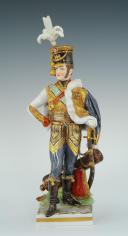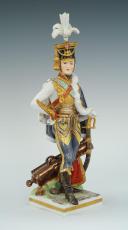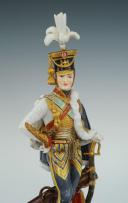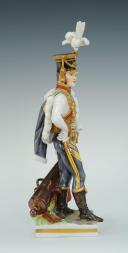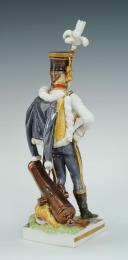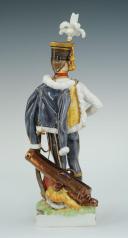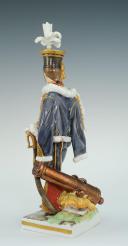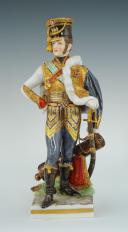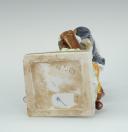
FIGURINE EN PORCELAINE DE LA MANUFACTURE ALLEMANDE DE DRESSEL KISTER À PASSAU REPRÉSENTANT LE MARÉCHAL JUNOT, PREMIER EMPIRE
Vendu
FIGURINE EN PORCELAINE DE LA MANUFACTURE ALLEMANDE DE DRESSEL KISTER À PASSAU REPRÉSENTANT LE MARÉCHAL JUNOT, PREMIER EMPIRE
Hauteur avec le socle en 27,5 cm.
Parfait état.
France.
Début XX°.
HISTORIQUE :
1853 - 1919: Dressel, Kister & Cie.
1919 - 1936: Aelteste Volkstedter Porzellanfabrik, Zweigniederlassung Passau
1937 - 1942: Porzellanfabrik Passau
In 1853 Johann Friedrich Andreas Kister and his associates bought a porcelain factory in Passau. The company was named Dressel, Kister & Cie. Kister bought this factory for his daughter, Therese whose husband Jacob Stark was his business partner. Stark died a year later, and Therese re-married Wilhelm Lenck, the son of a Thuringian porcelain painter, who was an expert in the manufacture of porcelain.
Company Dressel & Kister Cie. became a family-owned enterprise under the leadership of W. Lenck and has achieved market success. The factory's products were exported to many countries in the world and received many awards. When his son, Rudolf Lenck took over management, the factory employed 300 workers.
After the death of Rudolph, the factory took over his wife, Lina Lenck. Unfortunately, due to the chaos of war, she was forced to reduce production and eventually sold the factory in 1919. The buyer was other porcelain factory, Aelteste Volkstedter Porzellanfabrik, which operated in Passau under the name of Aelteste Volkstedter Porzellanfabrik AG, Zweigniederlassung Passau. The technical and artistic director since 1920 was Carl Graser of Volkstedt.
The situation worsened even further with the advent of the economic crisis of the 1920s and 1930s, when luxury goods were not available to buyers. Moreover, due to over-exploitation, nearby deposits of kaolin clay were exhausted. Eventually the factory declared bankrupt in 1936 and was taken over by the city of Passau.
In 1937 the factory took over Phillip Dietrich and ran it under the name Porzellanfabrik Passau. The production was completed in 1942. Three years later, as a result of warfare, the factory was destroyed and plundered.
- - -
In 1903, the company purchased about 350 forms for the Höchst figures from the Franz Anton Mehlem faience factory in Bonn-Poppelsdorf and successfully produced reproductions.
Kister and Dressel have owned a porcelain factory in Scheibe-Alsbach (Thuringia) since 1844, which in 1863 took over the son of Krister, August Wilhelm Fridolin Kister.
Hauteur avec le socle en 27,5 cm.
Parfait état.
France.
Début XX°.
HISTORIQUE :
1853 - 1919: Dressel, Kister & Cie.
1919 - 1936: Aelteste Volkstedter Porzellanfabrik, Zweigniederlassung Passau
1937 - 1942: Porzellanfabrik Passau
In 1853 Johann Friedrich Andreas Kister and his associates bought a porcelain factory in Passau. The company was named Dressel, Kister & Cie. Kister bought this factory for his daughter, Therese whose husband Jacob Stark was his business partner. Stark died a year later, and Therese re-married Wilhelm Lenck, the son of a Thuringian porcelain painter, who was an expert in the manufacture of porcelain.
Company Dressel & Kister Cie. became a family-owned enterprise under the leadership of W. Lenck and has achieved market success. The factory's products were exported to many countries in the world and received many awards. When his son, Rudolf Lenck took over management, the factory employed 300 workers.
After the death of Rudolph, the factory took over his wife, Lina Lenck. Unfortunately, due to the chaos of war, she was forced to reduce production and eventually sold the factory in 1919. The buyer was other porcelain factory, Aelteste Volkstedter Porzellanfabrik, which operated in Passau under the name of Aelteste Volkstedter Porzellanfabrik AG, Zweigniederlassung Passau. The technical and artistic director since 1920 was Carl Graser of Volkstedt.
The situation worsened even further with the advent of the economic crisis of the 1920s and 1930s, when luxury goods were not available to buyers. Moreover, due to over-exploitation, nearby deposits of kaolin clay were exhausted. Eventually the factory declared bankrupt in 1936 and was taken over by the city of Passau.
In 1937 the factory took over Phillip Dietrich and ran it under the name Porzellanfabrik Passau. The production was completed in 1942. Three years later, as a result of warfare, the factory was destroyed and plundered.
- - -
In 1903, the company purchased about 350 forms for the Höchst figures from the Franz Anton Mehlem faience factory in Bonn-Poppelsdorf and successfully produced reproductions.
Kister and Dressel have owned a porcelain factory in Scheibe-Alsbach (Thuringia) since 1844, which in 1863 took over the son of Krister, August Wilhelm Fridolin Kister.
Référence :
14441
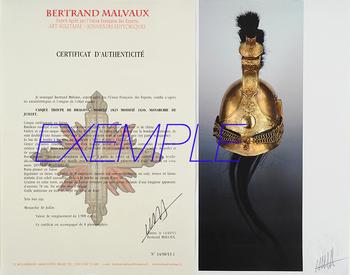
Prochaine mise à jour vendredi 4 avril à 13H30
POUR TOUT ACHAT, PAIEMENT EN PLUSIEURS CHÈQUES POSSIBLE
bertrand.malvaux@wanadoo.fr 06 07 75 74 63
FRAIS DE PORT
Les frais de port ne sont calculés qu'une seule fois par commande pour un ou plusieurs objets, les envois sont tous recommandés, car c'est le seul moyen d'avoir une preuve de l'envoi et de la réception.
Pour les colis dont la valeur ne peut être assurée par la Poste, les envois sont confiés à la société DHL ou Fedex avec valeur réelle assurée, le service est de qualité mais le coût est plus élevé.
DROIT DE RETOUR
Les objets peuvent être retournés dans un délai de 8 jours après leur réception. Il faut les retourner en recommandé aux frais de l'expéditeur, dans leur emballage d'origine, et dans leur état d'origine,
AUTHENTICITÉ
La sélection des objets proposés sur ce site me permet de garantir l'authenticité de chacune des pièces qui y sont décrites, tous les objets proposés sont garantis d'époque et authentiques, sauf avis contraire ou restriction dans la description.
Un certificat d'authenticité de l'objet reprenant la description publiée sur le site, l'époque, le prix de vente, accompagné d'une ou plusieurs photographies en couleurs est communiqué automatiquement pour tout objet dont le prix est supérieur à 130 euros. En dessous de ce prix chaque certificat est facturé 5 euros.
Seuls les objets vendus par mes soins font l'objet d'un certificat d'authenticité, je ne fais aucun rapport d'expertise pour les objets vendus par des tiers (confrères ou collectionneurs).
POUR TOUT ACHAT, PAIEMENT EN PLUSIEURS CHÈQUES POSSIBLE
bertrand.malvaux@wanadoo.fr 06 07 75 74 63
Un certificat d'authenticité de l'objet reprenant la description publiée sur le site, l'époque, le prix de vente, accompagné d'une ou plusieurs photographies en couleurs est communiqué automatiquement pour tout objet dont le prix est supérieur à 130 euros. En dessous de ce prix chaque certificat est facturé 5 euros.
Seuls les objets vendus par mes soins font l'objet d'un certificat d'authenticité, je ne fais aucun rapport d'expertise pour les objets vendus par des tiers (confrères ou collectionneurs).
